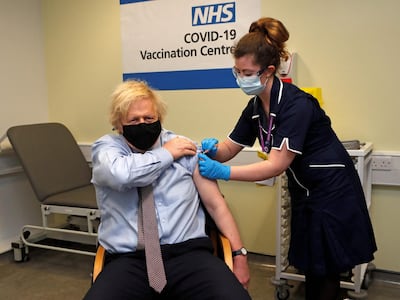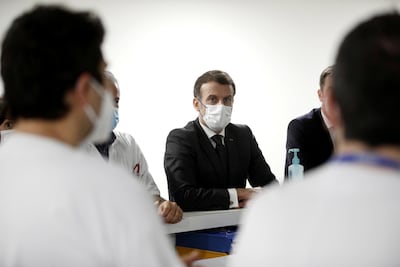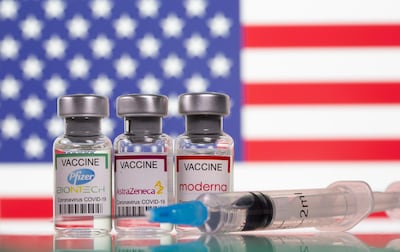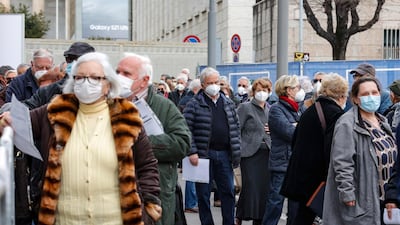Warnings from the World Health Organisation on the perils of vaccine nationalism have failed to prevent the scourge spreading. The worst transgressor has been the EU, which has dropped any pretence that it is an idealistic player on the world stage.
In fact the EU is uniquely placed to do great damage to the vaccine rollout across the globe. There is every sign that it is willfully and knowingly doubling down on its threats to stop exports of the vaccine and its ingredients.
The US is celebrating 100 million shots into American arms. With a slightly larger population the EU is languishing in the low tens of millions. Just 9.5 per cent of German and French adults have been immunised. Other countries are vaccine super powers when measured by per capita, most notably the UAE.
Recently bolted from the EU, the UK has rolled out jabs for more than 26 million of its approximately 70 million population.
At one point during its transition out of the EU, the government of Boris Johnson came under fierce criticism for spurning participation in the EU's vaccine procurement system. Now it is racing ahead on its own while Brussels is straining to meet even the modest targets it has set for its distribution project. Britain can still look forward to the remarkable feat of vaccinating its adult population with at least one dose by the end of June.
The founding impulse behind the EU was to heal the wounds of division in the European continent. By coming together and erasing differences, the EU is an explicit project in seeking harmony and the elimination of conflict.
Its behaviour is having the opposite effect. The failings in the vaccine scheme are multiple and successive. The supposed strengths of Brussels' regulatory regime have been its primary weaknesses.
First the EU failed to order a front-loaded schedule of vaccines. We know that its contract with AstraZeneca/Oxford was weaker in crucial legal provisions than the UK version. Europe's medicines agency failed to use the emergency provisions processes for approving the new drugs. It fell weeks behind the UK and the seeds of resentment were sown.
This month's investigation into blood clots led to more than a dozen European countries suspending the AstraZeneca roll out. With all the big countries joining the ban, the populations affected was vast.

Some European leaders tried to paint the move as a prudent measure to maintain confidence in the vaccine process. The argument went that by suspending AstraZeneca, the authorities were demonstrating that reported issues were being taken seriously.
In other words, there could be no truth in conspiracy theories that posited officials were reckless or malicious in promoting dangerous treatments.
Even though some European countries have resumed AstraZeneca vaccinations following an all-clear from EU regulators and the WHO, the suspension has damaged faith in the product. Even Britain experienced cancellations of vaccination appointments from the publicity questioning its safety.
There was a perverse impact, too. Angered Europeans expressed frustration that the governments were yet again throwing up new roadblocks in the vaccination campaign. Some were demanding the restoration of the AstraZeneca access, demands satisfied by a resumption of the rollout by some authorities.

French President Emmanuel Macron at one stage called AstraZeneca "quasi-ineffective" and gives every impression of wanting to undermine the product, presumably because it was developed in Oxford, not Orleans.
The EU position to the UK – and the rest of the world – is you cannot have what we don’t really want.
Mr Johnson was on the phone to the Belgian prime minister on Friday trying to ensure that shipments from the Pfizer facilities near Brussels continue. If these are interrupted, second doses for those already accessing the vaccine will be interrupted.
The EU could be described accurately as an integrated supply chain masquerading as a geopolitical power bloc. Shutting that down has international impact.
The threat to suspend millions of doses going from Belgium, the Netherlands and elsewhere to the UK is a direct and immediate shadow on supplies. The threat to interrupt the supply chain is even more insidious.
Vaccines are brewed in a biological process that is dependent on chemical reactions between ingredients. Any interruption of one part is a disruption of all.

Even in America, this is not a straightforward issue. Pfizer warned last week that US demand was curtailing production of other drugs. As 18 states joined the federal government in setting a May 1 deadline to triple the US vaccinated, the supply crunch will get even worse.
The mendacity of the European leadership in this situation grows ever harder to fathom. They are feeling the heat and want to provide political cover for their failings.
The legacy of this bitter period could take years to erase. Coming at time when there is nothing but friction with Britain over the post-Brexit arrangements, the strategic prospects for Europeans as a whole are calamitous.
This is to say little or nothing about the fact that the Europeans organised a global summit just 10 months ago to display their commitment to universal global access to the vaccine. Rarely has there been such a nakedly selfish set of behaviours put on display during a health emergency.
Vaccine nationalism is an evil. Leaders who aspire to be a global force for good cannot be absolved when they fall in its trawl.
Damien McElroy is the London bureau chief at The National


